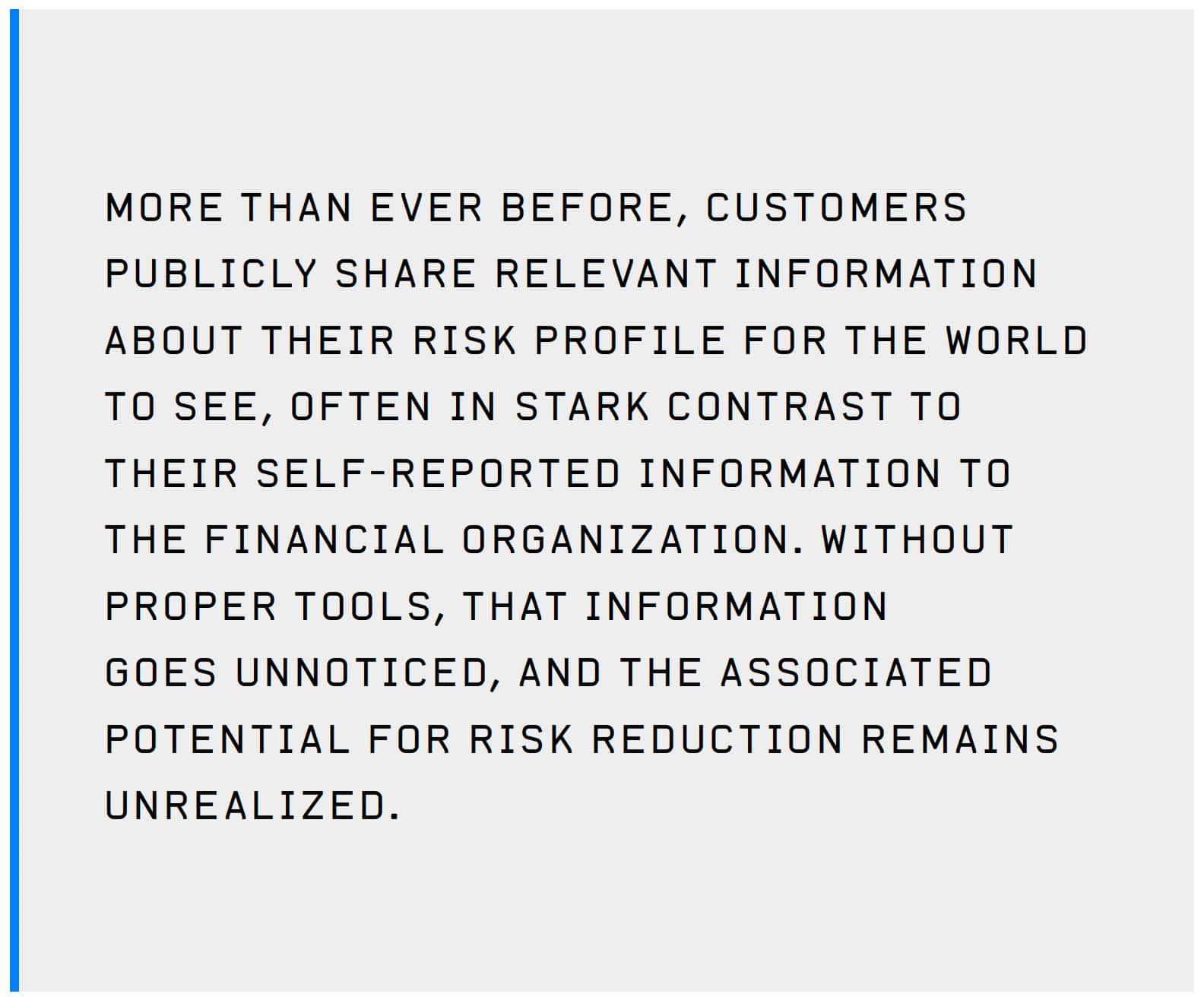KYC/AML INVESTIGATIONS
Threats to your institution exist in plain sight, but they go unnoticed and unreported every day. Adverse Media Screening (AMS) and Enhanced Due Diligence (EDD) are established practices of the past that must adapt to the breakneck speed of the social media revolution to remain relevant and effective. While efforts have been made to modernize these critical solutions, substantial elements of the KYC landscape still need to be revised to reduce financial institutions’ exposure to increasing levels of risk.
Without the proactive inclusion of social media sources – and subsequent integration into risk models – KYC/AML programs are missing critical, risk-based connections and money laundering risk indicators. In the wake of scandals like the 1 Malaysia Development Berhad (1MDB) and document leaks— such as the Panama and Pandora Papers—social media-based network analysis has highlighted structured connections and relationships across groups continually attempting to conduct illicit activity, launder money, and evade sanctions.

AML fines in 2022 totaled over US 8B dollars, with the majority of those penalties related to improper or incomplete identity verification or KYC solutions. One of the largest fines issued in 2022 identified a major European bank’s EDD processes as insufficiently complete and robust.
The Australian Transaction Reports and Analysis Center (AUSTRAC) levied debilitating fines against one of Australia’s largest gaming groups for failing to identify ultimate beneficial owners (UBO) and sources of funds (SOF). In both instances, it was clear that had social media intelligence been leveraged, they would have been able to address risks and comply with regulations.
Request our industry brief – Enhanced Customer and Employee Due Diligence
key features
- Advanced data collection and AI-powered risk analysis
- Automated network analysis
- Identify and preserve historical data for high-value, long-duration transactions
- Configurable APIs to broaden the scope of investigations
key benefits
- Concentrate resources on the highest-risk entities and organizations
- Establish a rich and full picture of a POIs digital footprint
- Zero in on the most relevant data and easily audit results
Compliance
The value of social media data is increasingly recognized in compliance regulations across the globe:
- The US Bank Secrecy Act and the US Patriot Act
- The European Union’s 6th Anti- Money Laundering Directive (6AMLD)
- The Australian Anti-Money Laundering and Counter- Terrorism Financing Act 2006

REGULATIONS AND SOCIAL MEDIA: WHY NOW?
Operating in a financial landscape interlaced by a dizzying array of sanctions regimes can be complicated to execute and fraught with reputational and legal risks. From human trafficking and compromised supply chains to transnational organized crime and terrorism, functioning in accordance with national and international laws – at speed and scale – poses a formidable challenge.
Social media content has proven pivotal for major institutions when evaluating opaque trust and ultimate beneficial ownership structures, as required by the 5th Anti-Money Laundering Directive (5AMLD).
Traditional AMS programs are complex, time-consuming, and often inaccurate. Existing solutions that lack social media integration are incomplete, leading to increased levels of risk and degrading the quality of conclusions provided to decision-makers.


Harnessing the information provided by Social Media and open-source Intelligence offers many benefits to financial intelligence teams and augments self-reported data.
OSINT-enabled analysts can leverage the vast amount of publicly available information online to aid in their workflows, both in terms of onboarding new clients and reviewing existing high-risk business, using numerous platforms and information sources to gain a 360-degree view that reduces overreliance on onboarding paperwork and improves the accuracy of analytical conclusions presented to leadership.
Leveraging OSINT to augment self-reported data also has secondary benefits, such as decreasing the associated friction of processing transactions and reducing compliance dwell time on specific transactions. Thus, overall output at the function level is increased, and profitability is ultimately improved.
ADVANCED OSINT CAPABILITIES
Fivecast’s open-source intelligence solutions will enhance and augment your institution’s compliance program as future regulations emerge and require this critical content as part of the CID, CDD, and EDD processes.
Fivecast solutions leverage industry-leading AI to return highly-filtered, relevant, configurable, and auditable results to end users. By combining advanced open-source data collection with AI-enabled risk analytics, Fivecast’s solutions reveal risks that compliance officials and regulators need to be aware of to combat illicit finance and malign actors effectively.
Investigations can be optimized to concentrate scarce compliance resources on the highest-risk entities and organizations without waiting for internal periodic reviews. This preservation and surfacing of historical knowledge is particularly beneficial to high-value, long-duration transactions involving Letters of Credit, Global Trade and Receivables Finance, and other large-sum transactions of particular interest to money launderers and sanctions evaders.
Request a customized demo to learn how Fivecast ONYX can support your KYC and AML INVESTIGATIONS:

